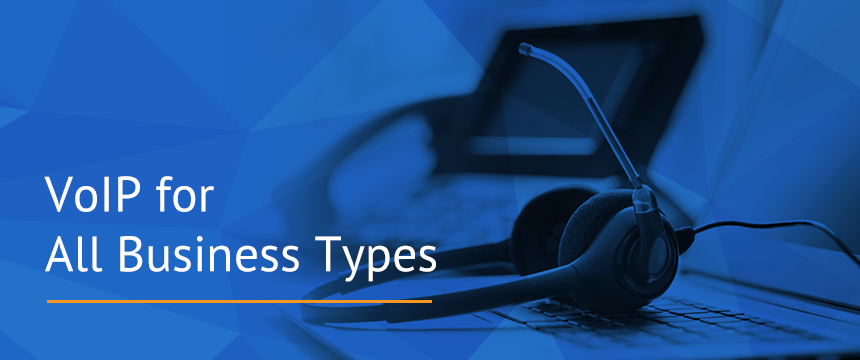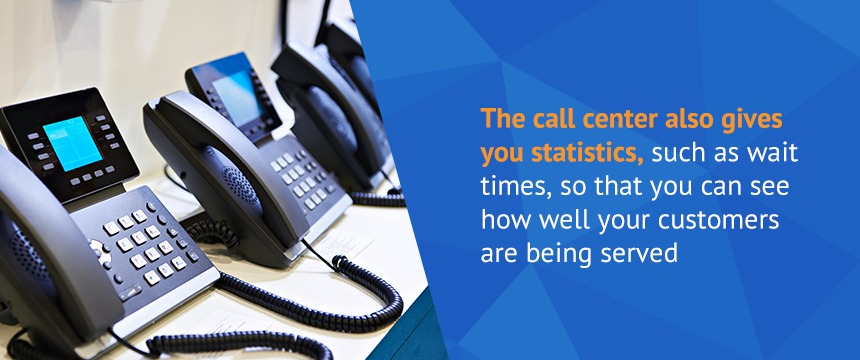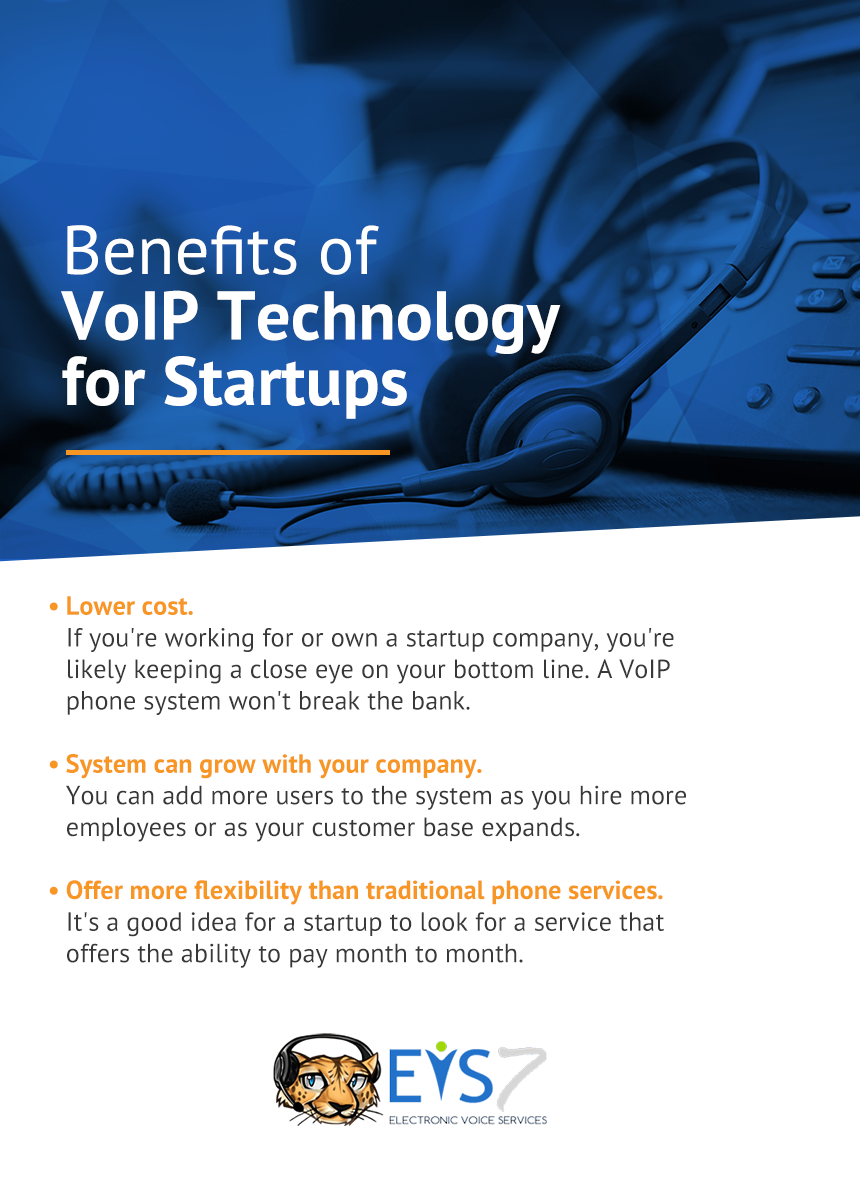
Phone service has come a long way since Alexander Graham Bell made the
first phone call back in 1876. Bell made the call in Boston, phoning up his assistant in the next room. Nearly 40 years later, phone lines stretched across the U.S. from the east coast to the west.
Although older, copper phone lines still exist in some areas, newer technology has largely replaced the older connections. One example of more modern phone technology is Voice over Internet Protocol, or VoIP.
What Is VoIP?
Unlike traditional phone service, which connects calls over copper or fiber lines, VoIP phone systems connect calls using computer networks. Traditional phone services send a person’s voice to the recipient of the call over a wire. VoIP system records what a person says, digitizes it, then sends it over to the recipient using a data connection. Once the data packet reaches the other end, it’s transformed back into sound, and the person on the other end of the call hears what was said.
VoIP technology can work in several ways. If you have ever called someone using Skype or Google Hangouts, you have already seen an example of VoIP in action. Calls on Skype and similar services are an example of computer-to-computer VoIP calls. They are made over your internet connection and are generally free of charge.
It’s also possible to make VoIP calls using a special IP phone. Unlike a traditional landline phone, an IP phone is connected to a router and a computer, allowing it to make and receive VoIP calls.
If you have an old landline phone that you are particularly fond of, you might be able to use an analog telephone adapter to transform it into a VoIP phone. An adapter allows you to connect nearly any type of phone to VoIP.
What Features Do VoIP Phone Systems Offer?
VoIP phone systems for business typically offer a full range of features. In many cases, a VoIP phone system will provide more features than a traditional phone line. Some of the standard features you can expect to see when your business switches to VoIP service include:
- Unlimited phone calls. With a VoIP system, your team can make as many calls as it needs to, without having to worry about using up minutes. Your calls can be local or long-distance.
- Multiple phone numbers. You can get one phone number for every user on the VoIP system. The phone number can be a local number or toll-free.
- Voicemail. If you miss a call, it will go to voicemail so that the caller can leave a message. Your voice messages can then be sent to you over email.
- “Do Not Disturb” mode. If you’re busy and can’t take calls, “do not disturb” mode sends any inbound calls right to your voicemail box.
- Call forwarding. If a team member is going away, they can use call forwarding to send any inbound phone calls to a co-worker’s number or any other phone number.
- Conference calling. You can connect with multiple phone numbers at once if you need to hold a conference call.
- Auto-attendant. An auto-attendant presents callers with a list of menu options.
- Call recording. If you’d like to record a phone call, you can with the call recording feature.
- Call transfer. If you’d like to send a call to a colleague, you can. The transfer can be announced or blind.
- Hold music. When you place people on hold, you have the option of having music playing, or you can play an ad for your business.
- Number porting. If your business already has a phone number, you can keep it when you switch over to VoIP.
- Mobility. You can take your phone number with you anywhere when you have a VoIP system. Employees can answer their phones whether they are in the office, working from home, or traveling for business.
- Call waiting. The phone will beep if a call comes in while you’re on another call.

You might also have the option of adding extra features to your business’ VoIP system, such as a feature that automatically records all calls that come in. Another optional feature is an inbound call center. With a call center, agents answer each call as it comes. The call center also gives you statistics, such as wait times, so that you can see how well your customers are being served.
What Is the Cost of a VoIP Business Phone System?
With traditional phone services, you typically pay a flat fee for the service itself. You then might be charged based on how many minutes you use or how many calls your company makes in a month. Usually, long-distance calls cost more than local ones.
VoIP phone services are typically considerably less expensive than traditional landline services. That’s even though they tend to offer more features and convenience than traditional phone systems. How much your business pays for a VoIP phone system depends in part on the company you decide to work with and whether or not you choose optional features.
When comparing the cost of a VoIP phone system, a few things to pay attention to include:
- Cost of setup/installation. Some VoIP providers charge a setup or installation fee. Others do not.
- Cancellation fees. If you enter into a contract for VoIP services, you might need to pay an early termination or cancellation fee if you decide to change providers or want to stop using the service before the contract is over. One way to avoid cancellation fees is to work with a company that offers its VoIP services on a month-to-month basis.
- Minutes fees. While some VoIP providers offer unlimited calls and no by-the-minute charges, a few do charge you for minutes used. Some companies claim to offer unlimited calling, then tack on an “overuse” fee.
- Taxes. Taxes can vary based on your company’s location.
- Cost of features. It’s often the case that a VoIP provider will bundle all of the features into the cost of the service. But some companies charge extra for features.
- Number of users. The cost of your VoIP phone system might be dependent on how many users you have. Some systems have a minimum number of users, while others will charge extra once you reach a certain amount of phone numbers.
Benefits of VoIP Phone Systems for Businesses
It doesn’t matter if your company is just getting started or if you’re in charge of choosing phone service for a multi-national enterprise. There are benefits to choosing VoIP for businesses of all sizes. Take a look at how VoIP can benefit your company, whether you’re working for a startup, a small or midsize business or a large company.
Benefits of VoIP Technology for Startups

A startup is a business that is just getting off of the ground. Usually, startups don’t have as many resources as older, bigger and more established companies. Even if they have financing, they typically need to be extra cautious about how they use it.
For startups, one of the most significant benefits of using VoIP solutions is the lower cost. If you’re working for or own a startup company, you’re likely keeping a close eye on your bottom line. A VoIP phone system won’t break the bank.
Another benefit of choosing a VoIP phone system is that the system can grow with your company. You can add more users to the system as you hire more employees or as your customer base expands. If you start with remote employees and end up opening an office later on, your team can move their phone numbers from their home offices to the company’s office.
On the practical side, VoIP phone systems typically offer more flexibility than traditional phone services. It’s a good idea for a startup to look for a service that offers the ability to pay month to month. If your company finds itself struggling, it won’t also have to worry about paying a hefty termination fee to its phone provider.
Benefits of VoIP Technology for Small Business
VoIP also offers multiple benefits to small businesses, which are often defined as
companies with fewer than 500 employees. Just like startups, small businesses are often keeping a close eye on the bottom line. You want to choose a phone system that will deliver the most bang for your buck, and VoIP does precisely that.
VoIP also offers many features that your business is likely to need as it grows. For example, with VoIP, you can use conference calling and can set up call forwarding. With these features, your clients are taken care of even if members of your team are out of the office or away on vacation.
The portability of VoIP is also a benefit to small businesses. If your team members often work from home, they can still be easily reached at their work number by their colleagues or clients.
A VoIP phone system can also help your company seem larger than it is. You can use features such as auto-attendant to pick up and direct calls automatically. You can also choose to have optional features such as an inbound call center to manage calls as they come in.
Benefits of VoIP Technology for Midsize Businesses
As a company grows, it can still enjoy the benefits of a VoIP phone system, such as reduced costs and the numerous features included with VoIP. If your business is in the process of rapidly expanding, it is easy for a VoIP phone system to grow with your company. If you’re using a month-to-month service, there won’t be an additional setup or installation charge to add new users.
A VoIP phone system also makes it easier for the employees of a medium-size, growing business to stay connected. It offers features such as conference calling and intercom, which lets one user contact another over speakerphone.
Benefits of VoIP Technology for Large Corporations
Large companies, which usually have over 1,000 employees and locations across the country or even around the globe, can also benefit from using VoIP phone systems, particularly the extra features typically available. An inbound call center can help to manage substantial call volumes, ensuring that people’s calls are answered in the order they were received.

Another benefit of a VoIP phone system for large companies is that it allows you to have either local phone numbers or toll-free numbers. You can set up a toll-free number so that people who use your services but don’t live nearby can reach you without paying long-distance fees.
The option of being able to record every call can be particularly useful for large businesses that are in the process of training new team members. You can record calls, then review them with your newest employees and discuss what went well in the call and what could go better next time.
Is VoIP Right for Your Business?
While VoIP can be an excellent option for businesses of all sizes, there are a few requirements your company needs to meet before it can install a VoIP system.
Since VoIP depends on the internet to work, your company needs to have a fast and reliable connection. Ideally, your download speed will be
at least 1 MB per user. If you do not yet have a fast connection, you’ll need to upgrade to a higher-speed internet service before you start to explore your VoIP options.
When it comes to equipment, your business will need to use IP phones to take advantage of VoIP. If you already have VoIP and are changing providers, you’ll likely be able to use your existing equipment with the new company.
If you’re new to VoIP and are buying new equipment, you have a few options. If each employee at your company will get their own phone line, each user will need their own VoIP phone.
EVS7 Provides VoIP Phone Systems to Businesses of All Sizes
Whether you’re managing the call center at a startup company or are part of the team at a large enterprise, EVS7 can help you get started with VoIP. ZoomCalls offers VoIP phone services with unlimited calling to the U.S. and Canada from around the world. You don’t have to worry about overuse charges, charges for standard features or other hidden fees with ZoomCalls. All the standard features are included with your service for no extra cost.
ZoomCalls frees your team up to do their work from anywhere. The system is mobile and portable, meaning your employees don’t have to hang around their desks when waiting for an urgent call to come in.
If you’re ready to see what VoIP can offer or are looking to switch your VoIP provider,
visit our ZoomCalls page to learn more and make a purchase. If you like what you see, you can purchase either a monthly, quarterly or annual plan, starting at $25 per month.

 You might also have the option of adding extra features to your business’ VoIP system, such as a feature that automatically records all calls that come in. Another optional feature is an inbound call center. With a call center, agents answer each call as it comes. The call center also gives you statistics, such as wait times, so that you can see how well your customers are being served.
You might also have the option of adding extra features to your business’ VoIP system, such as a feature that automatically records all calls that come in. Another optional feature is an inbound call center. With a call center, agents answer each call as it comes. The call center also gives you statistics, such as wait times, so that you can see how well your customers are being served.
 A startup is a business that is just getting off of the ground. Usually, startups don’t have as many resources as older, bigger and more established companies. Even if they have financing, they typically need to be extra cautious about how they use it.
For startups, one of the most significant benefits of using VoIP solutions is the lower cost. If you’re working for or own a startup company, you’re likely keeping a close eye on your bottom line. A VoIP phone system won’t break the bank.
Another benefit of choosing a VoIP phone system is that the system can grow with your company. You can add more users to the system as you hire more employees or as your customer base expands. If you start with remote employees and end up opening an office later on, your team can move their phone numbers from their home offices to the company’s office.
On the practical side, VoIP phone systems typically offer more flexibility than traditional phone services. It’s a good idea for a startup to look for a service that offers the ability to pay month to month. If your company finds itself struggling, it won’t also have to worry about paying a hefty termination fee to its phone provider.
A startup is a business that is just getting off of the ground. Usually, startups don’t have as many resources as older, bigger and more established companies. Even if they have financing, they typically need to be extra cautious about how they use it.
For startups, one of the most significant benefits of using VoIP solutions is the lower cost. If you’re working for or own a startup company, you’re likely keeping a close eye on your bottom line. A VoIP phone system won’t break the bank.
Another benefit of choosing a VoIP phone system is that the system can grow with your company. You can add more users to the system as you hire more employees or as your customer base expands. If you start with remote employees and end up opening an office later on, your team can move their phone numbers from their home offices to the company’s office.
On the practical side, VoIP phone systems typically offer more flexibility than traditional phone services. It’s a good idea for a startup to look for a service that offers the ability to pay month to month. If your company finds itself struggling, it won’t also have to worry about paying a hefty termination fee to its phone provider.
 Another benefit of a VoIP phone system for large companies is that it allows you to have either local phone numbers or toll-free numbers. You can set up a toll-free number so that people who use your services but don’t live nearby can reach you without paying long-distance fees.
The option of being able to record every call can be particularly useful for large businesses that are in the process of training new team members. You can record calls, then review them with your newest employees and discuss what went well in the call and what could go better next time.
Another benefit of a VoIP phone system for large companies is that it allows you to have either local phone numbers or toll-free numbers. You can set up a toll-free number so that people who use your services but don’t live nearby can reach you without paying long-distance fees.
The option of being able to record every call can be particularly useful for large businesses that are in the process of training new team members. You can record calls, then review them with your newest employees and discuss what went well in the call and what could go better next time.











